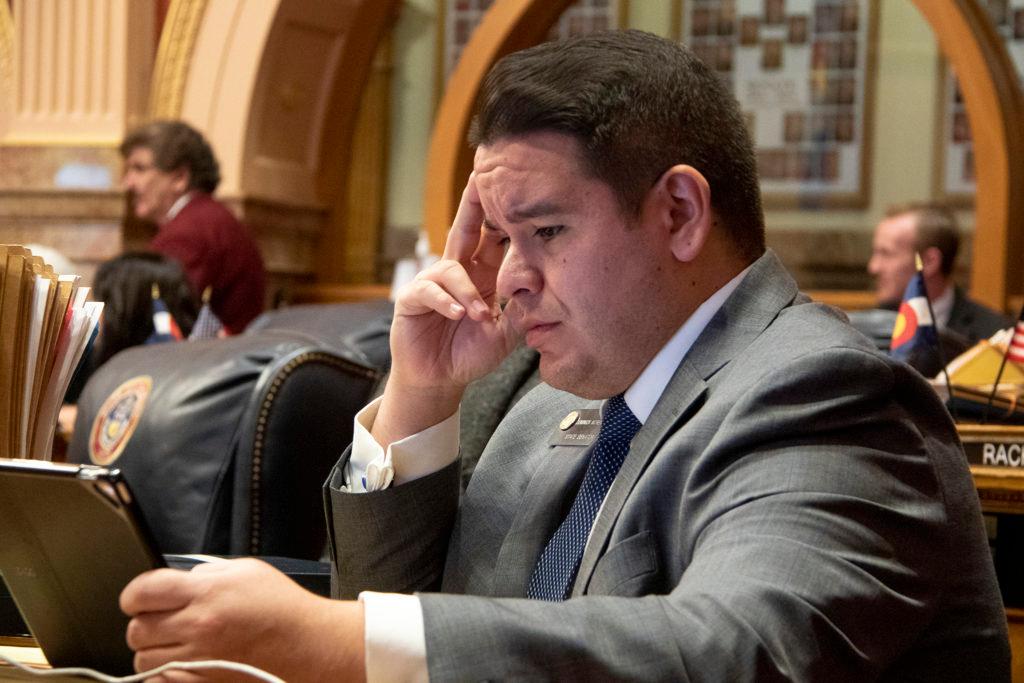
Democratic state lawmakers hope that a new compromise will clear the way for a paid family leave bill to advance this year, saving the proposal from the brink of collapse.
The idea of providing paid leave to care for for new children and family medical emergencies once seemed “inevitable,” said co-sponsor Rep. Matt Gray. It’s a priority for the party that controls the legislature and the governor’s office, but the effort has been bogged down by debates about how to institute the sweeping new benefit.
Two Democratic lawmakers dropped their sponsorship of the state bill last month, with concerns that it wouldn’t cover many vulnerable and low-income workers.
Backers found another Senator and Representative to replace them, and now they’ll try another compromise. They’re preparing to finally introduce the bill as the state legislature enters the second half of its session -- with a significant change.
The latest version sticks with the “private mandate” model championed by Gov. Jared Polis, requiring many employers to find a way to keep paying wages when employees need family or medical leave. But it also introduces an optional state-run program that would offer wage replacement insurance for seasonal workers, small-business employees, and others who wouldn’t get paid leave through work.
“It’s a paid leave protection fund, and it is to cover all the workers that are otherwise not covered, as an option,” said Sen. Faith Winter. “Ultimately, we’ve always wanted to cover as many people as possible, and this is another way to do that.”
Here’s what we know about the latest proposal:
- Companies with more than 20 people would have to provide paid leave for employees. They could offer it as a direct benefit for buy insurance from a regulated market to cover the cost. But the mandate would exclude seasonal workers -- a concern for the ski and agriculture industries in particular.
- People who don’t get paid leave through their employer could instead buy into a state-run program that would pay their wages when they take family or medical leave.
- The state option would be funded in part by premiums paid by individuals who want the coverage. It also may be funded by fees on employers, but the sponsors are still figuring that out, Winter said.
- The cost to the employee, whether provided by an employer or through the state program, could not exceed 0.5 percent of a person’s wages.
There are still some big, unanswered questions, though. Most notably, the sponsors haven’t said how much it would cost to create the state-run plan. The financial details would be determined later by nonpartisan state analysts and released as a fiscal note for the bill.
“We’re working out the details of that funding right now,” said Winter, who was wrapped up in a frenzy of meetings about the proposal on Wednesday.
Originally, advocates for paid leave wanted all employees to be covered by a billion-dollar public fund, but Gov. Jared Polis opposes creating such a large new program. The sponsors may have to overcome similar skepticism in the legislature about their new proposal.
“We’ve got the backbone of a system that works pretty well for the employers who can deliver this as a normal part of doing business. We’re looking at coming up with a system that can fill the gaps in between for some other folks,” Gray said.
Further details from the draft bill:
- People wouldn’t be paid their full wages while on leave; instead the benefit would be determined by a formula and initially capped at $1,000 per week.
- The requirement would start at 8 weeks of paid leave in 2022 and grow to 12 weeks by 2027.
- People would have to work at a job for three months before becoming eligible for paid leave, Winter said. This was six months in an earlier version.
- It hasn’t been decided how long an individual must be enrolled in the state option before they can collect benefits, Gray said.
Sen. Angela Williams and Rep. Monica Duran, both Democrats, dropped their sponsorship of the bill over concerns about who would be covered. Earlier this week, Williams said she was still discussing the bill. Every vote will matter if the bill proceeds, since the Democrats hold a relatively narrow margin in the Senate.
The bill also has two new sponsors: Sen. Dominick Moreno of Commerce City and Rep. Yadira Caraveo of Thornton, both Democrats. Republicans have strongly objected to paid leave proposals in the past, arguing the government should not interfere in the benefits companies offer their employees.









